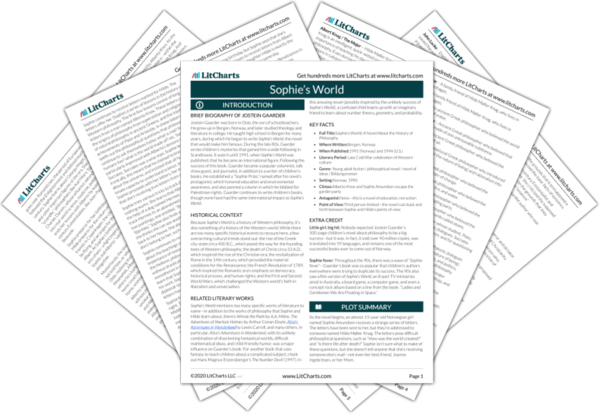Summary
Analysis
Still sitting in the room with Alberto, Sophie asks him to tell her more about the Baroque era. Alberto begins to tell Sophie about Baruch Spinoza, an important student of Descartes. Spinoza was a radical figure in his day—he questioned both Christianity and Judaism, arguing that the Bible should be read critically and contextually, not as the infallible word of God. Spinoza’s friends and family tried to send him to jail. Spinoza himself was never wealthy—he earned a living polishing lenses for spectacles.
Spinoza’s life is a classic example of philosophy as a dangerous, radical endeavor. Spinoza used logic and empiricism to question the authority of the most powerful people in his society—the clergymen. For this reason, he was widely hated and vilified. And yet Spinoza’s ideas seem fairly uncontroversial by modern standards.
Themes
Spinoza, Alberto continues, believed that God was present in nature—in short, God is the world. This is a complicated idea. Spinoza disagreed with Descartes that the world was divided into thought and substance—instead, he argued that the only real thing was God. But since God is the world, thought and substance are just two difference versions of the same thing: God. Alberto clarifies this with an analogy: at any given time, you could have a stomachache. Five minutes later, you could remember the feeling of the stomachache. The same being is present throughout this process: you. The point of the analogy is that the experience of the stomachache and the memory of the stomachache aren’t so different—they’re just experienced at different times. The same is true of reason and substance—they’re just two different versions of God. Sophie finds this confusing, but thinks she’s beginning to understand.She compliments Albertofor his knowledge of philosophy. Alberto replies, “A mere bagatelle.”
One of the trickiest aspects of Spinoza’s argument is the idea that thought and matter are two different versions of the same substance. It seems impossible that this could be true,and yet Sophie’s World—the novel itself—helps us understand Spinoza’s ideas by illustrating them in the plot of the book. Just as Spinoza believed that God is everywhere in the world and is the world, so too might we say that Sophie and her surroundings are all aspects of Albert Knag’s semi-divine authority; they could even be termed parts of Albert Knag himself. Also note that Alberto modestly refers to his intellectual achievements as “a mere bagatelle” (a trifle). We’ll return to this phrase a few more times.
Themes
Alberto transitions toSpinoza’s idea of free will. Because Spinoza believed that the world is God, it’s often suggested that Spinoza didn’t believe in free will at all. Alberto admits that Spinoza believed that everything that happens has to happen—everything in the world operates according to the laws of physics. Spinoza argued that people don’t choose their nature. Alberto gives an example: lions don’t choose to hunt prey; cavemen don’t choose to worship tribal gods or hunt leopards; and a newborn baby doesn’t choose to cry. Even a fully-grown human isn’t really choosing to get a job, get married, etc.—she’s just living out her nature. But because “human nature” consists of so many complicated causes, humans forget that their actions are predetermined. The only pathway to happiness is to accept the truth: freedom is an illusion.
Spinoza argues that freedom, as it’s traditionally understood, is just an illusion. This is a surprising idea, and should be unpacked a little. Spinoza, first of all, doesn’t believe that it’s possible for human beings to “choose” what they want to do: their desires and motivations are already imprinted into their very being. But even if freedom as we usually conceive of it is impossible, we can still find a state of enlightenment by acceptingour lack of agency. In order to do this, humans must study philosophy and religion carefully. Once again, this seems to be relevant to Sophie’s life. She is becoming increasingly aware of her lack of freedom, and yet she also seems to be gaining wisdom.
Themes
Alberto offers Sophie a banana, and Sophie, who’s hungry, accepts it. She’s surprised to see a message written inside the banana: “Here I am again, Hilde.” Sophie is confused, and wonders if Hilde’s father could have sent the banana all the way from Lebanon. She leaves Alberto and returns to her mother.
Each “trick” that Hilde’s father plays seems more extravagant than the last—Hilde’s father (Albert, we now know, is like a magician. The mystery, then, is why Albert is doing all this: what’s his goal?
Themes
Get the entire Sophie’s World LitChart as a printable PDF.













